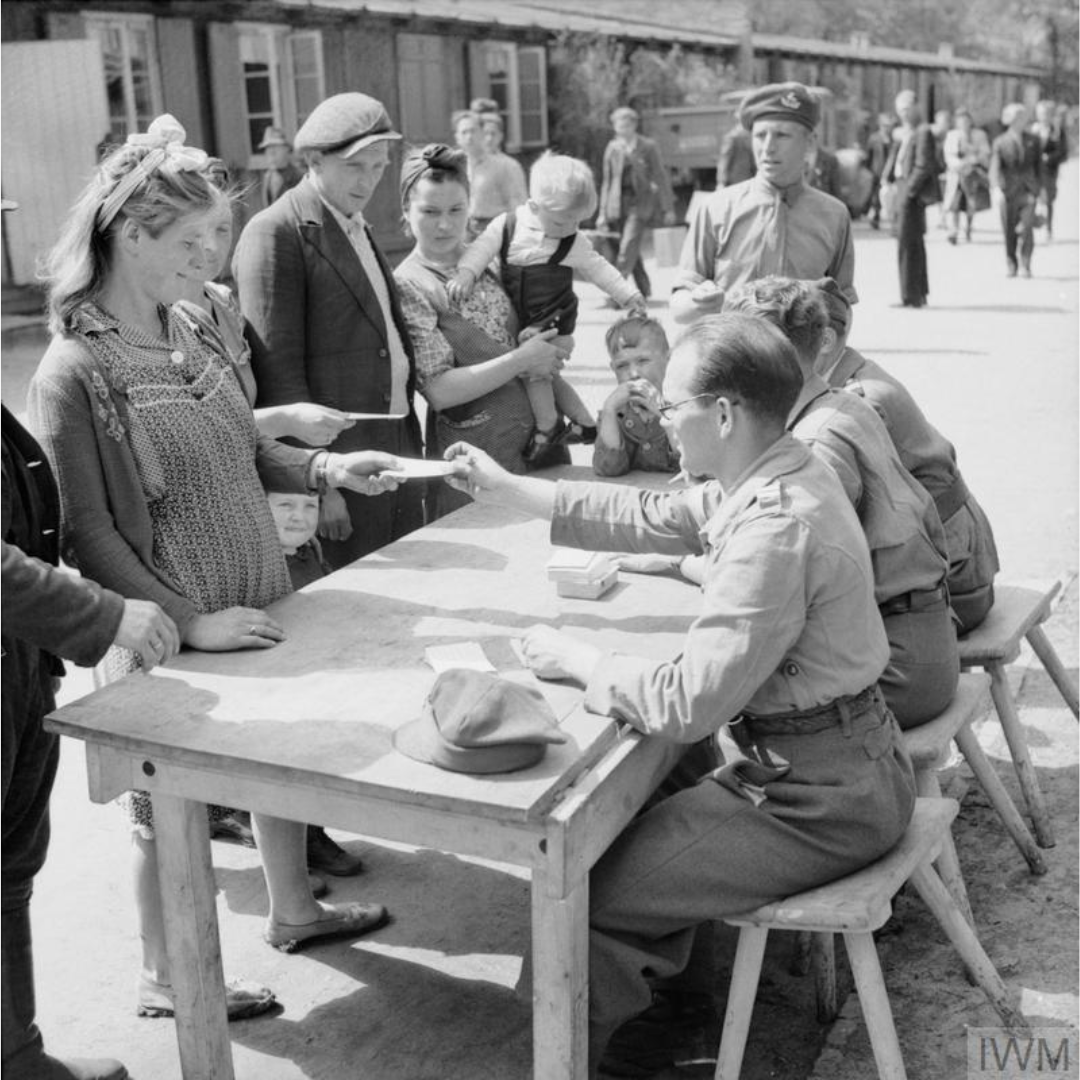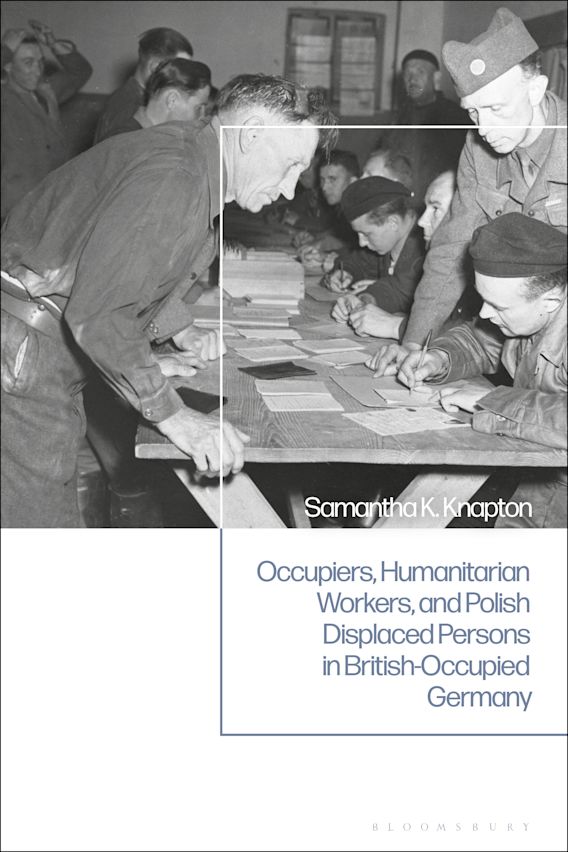An examination of Polish Displaced Persons after the Second World War
 A Polish family registering at No.17 Displaced Persons Assembly Centre in Hamburg Zoological Gardens. Source: IWM (BU 6634)
A Polish family registering at No.17 Displaced Persons Assembly Centre in Hamburg Zoological Gardens. Source: IWM (BU 6634) 
Published by: Bloomsbury
 A Polish family registering at No.17 Displaced Persons Assembly Centre in Hamburg Zoological Gardens. Source: IWM (BU 6634)
A Polish family registering at No.17 Displaced Persons Assembly Centre in Hamburg Zoological Gardens. Source: IWM (BU 6634) Samantha Knapton’s book, Occupiers, Humanitarian Workers, and Polish Displaced Persons in British-Occupied Germany, provides a compelling and nuanced exploration of the complex interactions and dynamics among British occupiers, humanitarian workers, and Polish Displaced Persons (DPs) in the aftermath of the Second World War. The book contributes significantly to our understanding of the intricate social and political landscape of post-war Europe, shedding light on the experiences of a specific group of displaced individuals and the challenges they faced. By focusing on the often-overlooked British zone, the book challenges the historiographical imbalance that has predominantly focused on the American zone.
Knapton skillfully navigates through a variety of primary sources, including archival materials, personal testimonies, and official documents, to construct a comprehensive and well-documented narrative. Her meticulous research allows readers to gain a deep insight into the lived experiences of Polish DPs and the multifaceted relationships that developed within the context of British-occupied Germany. Her exploration of sacral nationalism among Polish DPs adds a layer of complexity to their identity and resilience, broadening our comprehension of this displaced community’s collective experiences. Additionally, highlighting the unique character and importance of Maczków, the capital of “little Poland in exile,” the book explores the creation of exiled community and its relations with local Germans.
One of the notable achievements of the book is its exploration of the challenges faced by humanitarian workers in balancing their roles as facilitators of relief and representatives of occupying forces.
One of the strengths of the book is its attention to the perspectives of all key actors involved. Knapton offers a balanced analysis that considers the motivations, constraints, and agency of not only the DPs but also the occupiers and social workers. By doing so, she paints a nuanced picture of the power dynamics at play and the ways in which various actors negotiated their roles in the post-war landscape. For instance, Knapton’s analysis of social worker Rhoda Dawson’s writing provides an intimate look into the challenges faced by Polish DPs and welfare workers. It traces patterns emerging from welfare workers’ writing, showing how they tended to speak and think about DPs. As Knapton writes, “attitudes towards the Poles reflected UNRRA’s paternalistic approach which sought to infantilize the DPs” (p. 71). As she shows, using expressions such as a “swarm of bees” (p. 69) to describe refugees, was commonplace. At the same time, the author successfully portrays the enduring bonds forged between DPs and social workers, showcasing the human side of post-war reconstruction.
Furthermore, the author effectively places her study within the broader historiographical context, engaging with existing scholarship on DPs and post-war reconstruction. One of the notable achievements of the book is its exploration of the challenges faced by humanitarian workers in balancing their roles as facilitators of relief and representatives of occupying forces. Knapton critically examines the tensions that arose as these workers navigated the fine line between providing assistance to DPs and fulfilling the broader political objectives of the occupying forces. Beyond the history of Anglo-Polish relations, Knapton’s work extends its significance to the broader context of UNRRA and post-war reconstruction.Knapton also highlights labor shortages in the UK as a driving force behind resettlement schemes such as Westward Ho, demonstrating how pragmatic considerations shaped the post-war resettlement initiatives.
In conclusion, Occupiers, Humanitarian Workers, and Polish Displaced Persons in British-Occupied Germany stands as a valuable contribution to the historiography of post-war Europe and the first monograph focusing in depth on the Polish DPs in the British zone of occupied Germany. Through meticulous research and a thoughtful examination of diverse perspectives, the book enriches our understanding of the complexities surrounding the displacement, relief efforts, and interactions between aid providers and aid recipients in the aftermath of Second World War. This work will undoubtedly be of interest to scholars, students, and anyone seeking a deeper understanding of Polish migration history, Anglo-Polish relations, and post-Second World War reconstruction. Knapton’s clear writing style and careful organization of the material also makes the book appealing for a wider readership, especially members of the Polish diaspora.
Dr Katarzyna Nowak is a historian specialising in cultural and social history of Cold War, with a particular interest in refugee and migrant history. During her doctoral and postdoctoral research at the University of Manchester and Vienna Wiesenthal Institute for Holocaust Studies, she focused on Displaced Persons in the early Cold War period in the global perspective. Her first monograph, entitled Kingdom of Barracks. Polish Displaced Persons in Allied-occupied Germany and Austria was published in 2023 by McGill-Queens University Press. She has published on the history of gender, refugees, and diaspora. Currently, she is a Marie Cure fellow at the University of Vienna, working on the project on the Vatican’s involvement in post-World War II refugee aid.

Occupiers, Humanitarian Workers, and Polish Displaced Persons in British-Occupied Germany
Published by: Bloomsbury
